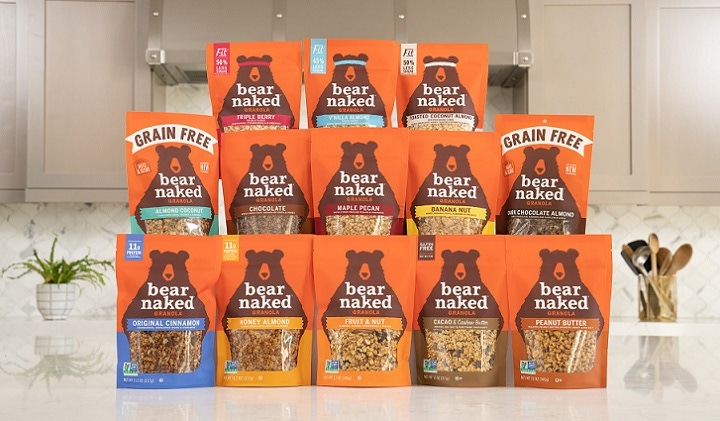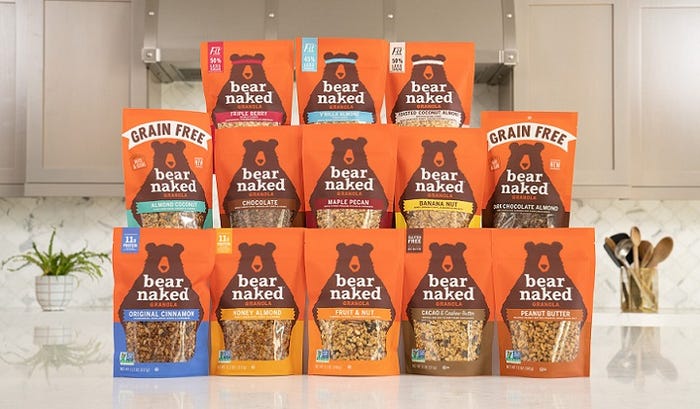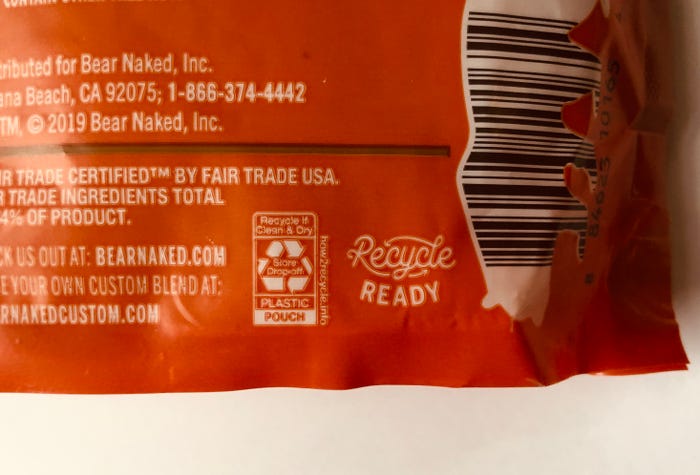The brand’s lead packaging engineer identifies nine key aspects in the 18 months' R&D required to make Bear Naked brand granola bites and cereal pouches recyclable.

Kellogg’s lead packaging engineer Shannon Moore shares an insider’s view of the development including key considerations, what was learned, advice and more.
1. It’s a breakthrough accomplishment.
Kellogg’s Bear Naked Inc. granola division’s develops the first fully recyclable stand-up barrier pouch made for food packaging that’s available nationwide.
2. The pouch rollout involves all Bear Naked core product lines of granola cereal and bites.
Done across some 13 product lines, “all of the granola has already converted over and we are currently in the process of rolling it out on our bites,” Moore discloses.

3. The pouch structure was turned from inconvenient and unconventionally recyclable to conveniently recyclable.
The previous pouch structure was recyclable due to a special an arrangement with Trenton, NJ-based upcycler TerraCycle. While commendable in diverting packaging from landfill, the process wasn’t efficient or convenient: recycling required customers to sign up for a special program to collect, clean and ship the packaging to NJ for recycling otherwise the packaging was trashed by consumers and sent to landfill.
The new packaging can be recycled using convenient at-store drop-off locations in meeting the standards of the Sustainable Packaging Coalition’s How2Recycle program. That information appears along the bottom of the back panel next to a “Recycle Ready” callout.
4. Kellogg’s needed 18 months’ R&D to reinvent the pouch.
According to Moore, validation and shelf-life testing took the bulk of that time.
The new Bear Naked granola packaging is manufactured by Berry Global, which has nine-layer blown extrusion equipment that provides the stiffness and superior sealing for hermetic packaging with gas flushing. Bear Naked also chose Dow Chemical’s RecycleReady technology that enables recyclable film structures (see Bear Naked ends partnership with TerraCycle; develops new recyclable packaging for granola snacks, published May 2019).
The new pouch film is mono-material PE with ethylene vinyl alcohol (EVOH) barrier; the previous structure was a multilayer PET/polyethylene film.
5. The project required an unusual arrangement and strategic partnerships across the entire value chain.
It was managed end-to-end from the resin manufacturing all the way through to the transportation and customer involvement, Moore reports, involving “a lot of collaboration and partnership between the different players depending on their place in the supply chain.”
In addition to resin supplier Dow and film provider Berry Global, other vendors included Presto Products Co. that provided the recycling-compatible Fresh-Lock zipper and printer/converter ColorMasters, based in Albertville, AL.
According to Moore, the direct involvement of a resin supplier was highly atypical of a Kellogg’s packaging development.
Contract manufacturing partner Hearthside Food Solutions, Downers Grove, IL, was also involved, Moore adds.

6. Retaining the look, feel and product quality of the brand was essential.
Surface-printed by ColorMasters, the pouch has a matte finish and a window on the front in line with the previous packaging. A ColorMasters sales manager tells PlasticsToday that it converted rollstock film supplied by Berry Global into printed rollstock for vertical-form-fill-seal packaging and premade pouches for the brand. The process included applying a heat-resistant coating, he added.
“We had to also maintain our existing shelf life in the new film, which appears on the pouch bottom,” Moore adds.
As importantly, she points out that the film’s compatibility with the company’s existing packaging equipment had to be seamless.
7. There’s no “one size fits all” in sustainable packaging.
“Involvement and engagement from all parts of the material spectrum is very important when designing for sustainability,” explains Moore. “It’s really important to understand your consumers’ needs, the level of understanding they have around sustainable packaging and what your vendor partners capabilities are. Also, having a good understanding of the recycling infrastructure in your area or country is important from a design aspect.”
8. Deep learnings were gained.
“This was a very intense project to lead, but if you were to ask anyone on the team, the one theme you would hear is that everyone gained a deep knowledge about another area of the packaging value chain that they didn’t have previously,” Moore reports. “We will all use the experience to help further sustainable packaging design in future project work.”
And from a personal perspective, what was most gratifying for her was “being able to be a part of an important goal for the brand and being able to see it from initial ideation to launch.”
9. The reception has been positive.
In addition to knowing the pouch’s recyclability is a positive step for the environment, the pouch’s innovation has been recognized by the industry: it received the 2019 Technology Excellence Award in Snack and Bakery during Pack Expo in September and in January, the pouch was chosen for a Silver Award in Sustainability in the Flexible Packaging Assn.’s 2020 FPA Achievement Awards.
About the Author(s)
You May Also Like




